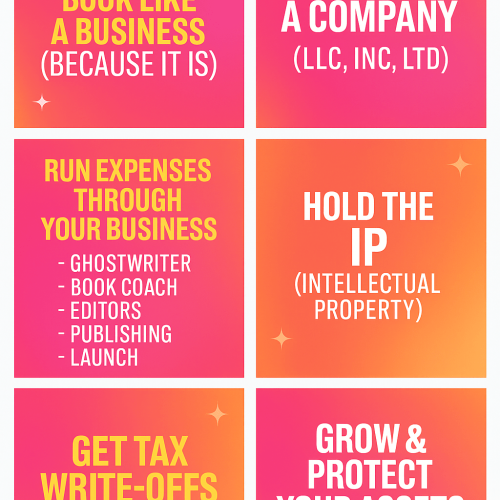“Your book is not just a story — it’s an asset.
And if you treat it like a hobby, it will pay you like one.”
Let’s be honest: too many brilliant writers stop short of claiming their full power.
They write beautiful words, but forget the business that makes those words work for them.
If you want your book to pay you back, you have to start thinking like a CEO — not just an author.
The Author Myth That Keeps You Broke
Somewhere between “follow your muse” and “publish your masterpiece,” a dangerous myth snuck in:
that writing is pure art, untouched by commerce.
That myth is why so many incredible authors end up exhausted, underpaid, and under-valued.
The truth?
Your book is a business — and your words are your intellectual property.
When you learn to treat that IP like the high-value asset it is, everything changes: your income, your influence, and your impact.
Step 1: Set Up a Company (LLC, Inc, Ltd)
Think of this as building the legal foundation for your Author Empire.
When you publish through your own business entity, you:
- Protect your personal finances and liability
- Simplify accounting and taxes
- Look instantly more professional to partners, agents, and publishers
- Create a container to hold your IP (your crown jewels)
“Your company isn’t red tape — it’s the castle wall that protects your creative kingdom.”
Whether you’re in Canada, the US, the UK, or New Zealand, talk to a local accountant or business advisor. A few hundred dollars now can save you thousands later.
Step 2: Run Expenses Through Your Business
Your book has startup costs.
That doesn’t make it a hobby — it makes it an investment.
You can often claim legitimate business expenses like:
- Ghostwriting or book coaching fees
- Editing and proofreading
- Design, publishing, and distribution costs
- Marketing and PR
- Website, launch materials, and even professional photos
When you run these through your company, you’re not “spending on your dream” — you’re building an asset.
Every invoice becomes a brick in your author foundation.
Step 3: Hold the IP (Intellectual Property)
This is where the real leverage lives.
If you sign away your rights to a publisher, they control how, where, and when your book earns. You’ll receive a small slice of the pie.
When you hold your IP inside your company, you control the entire ecosystem of your ideas:
- Courses and digital programs
- Speaking engagements
- Consulting and licensing opportunities
- Film, TV, or audiobook rights
“Your book is the front door to everything you’ll ever build.”
Don’t hand that door to someone else.
Step 4: Get the Tax Write-Offs
Operating as a business means you can deduct legitimate expenses for:
- Marketing and advertising
- Professional development (retreats, courses, coaching)
- Travel tied to your book or business
- Home office or studio space
- Tech and tools (computers, software, microphones, etc.)
Tax laws vary, so get professional guidance — but know this: when you operate strategically, your creativity becomes one of the smartest financial tools you own.
Step 5: Grow and Protect Your Assets
Your book isn’t just words on a page.
It’s leverage — visibility, credibility, and longevity wrapped into one.
Here’s how to protect it:
- Register your copyright properly
- Keep digital and paper records of your contracts
- Monitor distribution and royalty reports
- Renew domain names and trademarks tied to your book
- Set up clear terms if co-authoring or collaborating
And here’s how to grow it:
- Pitch yourself for media, podcasts, and partnerships
- Turn chapters into workshops or keynotes
- Build community around your message
- Use your book as the entry point for bigger offers
“A book isn’t a finish line. It’s the beginning of your brand.”
The Author-CEO Mindset
The difference between authors who sell books and authors who build empires comes down to one thing: mindset.
Author-CEOs:
- Plan their ROI before they write
- Build backend offers (courses, retreats, consulting)
- Treat their book launch like a product launch
- Protect their IP like a boss
- Keep growing, licensing, and leveraging long after publication
If you’re serious about impact — and income — your next chapter isn’t just creative. It’s corporate.
You can be both an artist and an entrepreneur.
You can lead with creativity and think with strategy.
You can write from the heart and operate from the head.
Treat your book like a business — because it is one.
And when you do, you’ll discover that your words aren’t just powerful — they’re profitable.
💼 Ready to Turn Your Book Into a Business Asset?
At Word Magic, I help authors transform their manuscripts into money-making, brand-building, IP-driven empires.
Whether you’re ready to hire a ghostwriter, start your book coaching journey, or calculate your Author Empire ROI, this is where the business of words gets brilliantly strategic.





